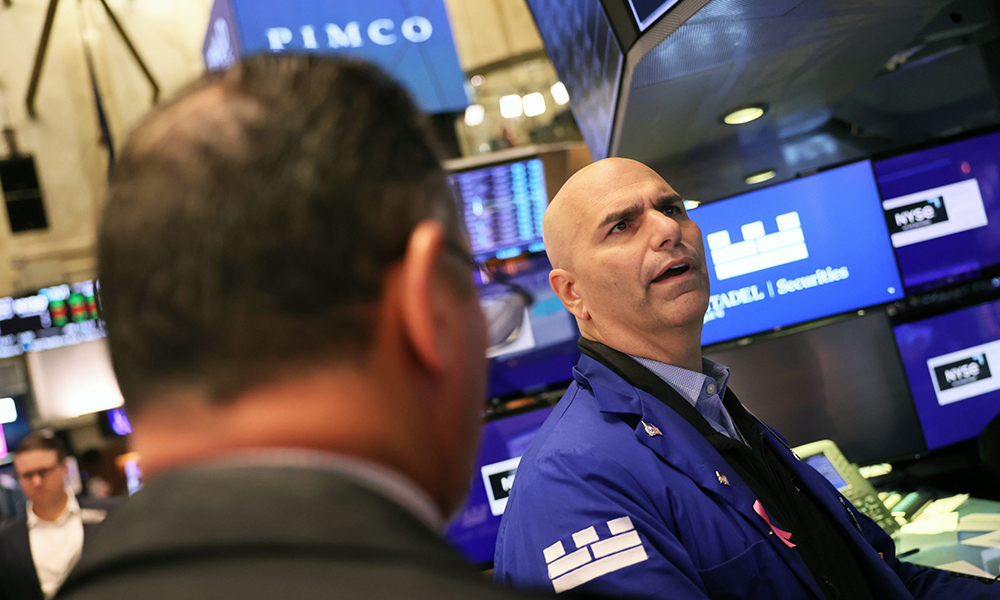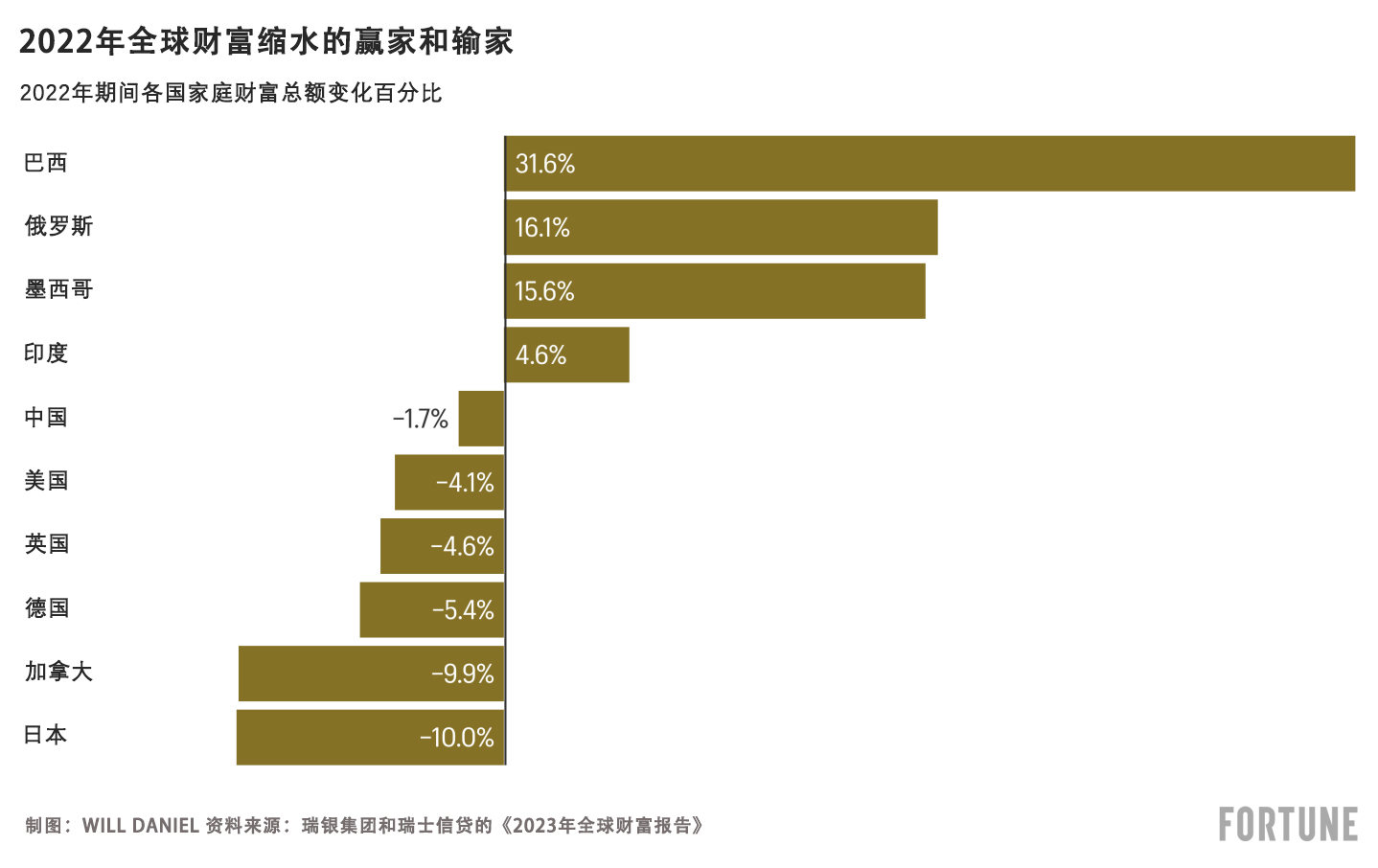
一份最新报告显示,2022年,由于股市暴跌和强势美元对国际资产价格的影响,全球财富自全球金融危机以来首次缩水。
由瑞银集团(UBS)和瑞士信贷(Credit Suisse)周二发布的《2023年全球财富报告》发现,去年私人财富总额减少2.4%或11.3万亿美元,减少至454.4万亿美元,成年人人均财富缩水3.6%,减少3,198美元至84,718美元。
假设汇率维持在2021年的水平不变,2022年财富总额实际上增长了3.4%。但作者认为,这依旧是“自2008年以来假设汇率不变的情况下最慢的财富增长速度”。该报告调查了全球54亿成年人的财富状况。
2022年,全球经济从新冠疫情中艰难复苏。高通胀迫使多国央行加息,再加上俄乌冲突对经济增长的影响,消费者和企业的借款成本增加。
去年,随着股价和债券价格暴跌,发达地区受到的影响最为严重。去年,北美和欧洲的财富共缩水10.9万亿美元,亚太地区财富缩水2.1万亿美元。
而非洲和印度在2022年财富分别增长了1.5%(850亿美元)和4.6%(6,750亿美元)。瑞银集团和瑞士信贷表示,拉丁美洲是去年的“例外”。由于美国制造业转为近岸外包,并且当地货币兑美元平均升值6%,因此该地区的财富总额增长了18.6%(2.4万亿美元)。
在国家层面,美国名义财富金额减少5.9万亿美元,降幅最大,但同比仅减少了4.1%。从降幅来看,埃及财富降幅最大,由于通胀暴涨和埃及磅贬值37%,平均家庭财富缩水22.7%。
2022年的最大赢家是巴西。巴西平均家庭财富暴涨31.6%(1.1万亿美元),部分原因是相对强劲的GDP增长(2.9%),以及巴西雷亚尔兑美元升值。俄罗斯和墨西哥的财富分别增长了16.1%和15.4%。墨西哥货币兑美元升值,且GDP增长3.1%。而在俄罗斯,由于利率下降和俄罗斯卢布升值5.6%,导致其房价大幅上涨。

虽然2022年全球财富缩水,但瑞银集团和瑞士信贷预计未来几年会有所好转。瑞士信贷欧洲、中东、非洲地区首席投资官兼全球经济与研究负责人纳内特·赫克勒-法伊德赫比表示,到2027年,随着中等收入国家持续发展,全球财富将增长38%,达到627万亿美元,因此他认为“前景更加光明”。(财富中文网)
翻译:刘进龙
审校:汪皓
一份最新报告显示,2022年,由于股市暴跌和强势美元对国际资产价格的影响,全球财富自全球金融危机以来首次缩水。
由瑞银集团(UBS)和瑞士信贷(Credit Suisse)周二发布的《2023年全球财富报告》发现,去年私人财富总额减少2.4%或11.3万亿美元,减少至454.4万亿美元,成年人人均财富缩水3.6%,减少3,198美元至84,718美元。
假设汇率维持在2021年的水平不变,2022年财富总额实际上增长了3.4%。但作者认为,这依旧是“自2008年以来假设汇率不变的情况下最慢的财富增长速度”。该报告调查了全球54亿成年人的财富状况。
2022年,全球经济从新冠疫情中艰难复苏。高通胀迫使多国央行加息,再加上俄乌冲突对经济增长的影响,消费者和企业的借款成本增加。
去年,随着股价和债券价格暴跌,发达地区受到的影响最为严重。去年,北美和欧洲的财富共缩水10.9万亿美元,亚太地区财富缩水2.1万亿美元。
而非洲和印度在2022年财富分别增长了1.5%(850亿美元)和4.6%(6,750亿美元)。瑞银集团和瑞士信贷表示,拉丁美洲是去年的“例外”。由于美国制造业转为近岸外包,并且当地货币兑美元平均升值6%,因此该地区的财富总额增长了18.6%(2.4万亿美元)。
在国家层面,美国名义财富金额减少5.9万亿美元,降幅最大,但同比仅减少了4.1%。从降幅来看,埃及财富降幅最大,由于通胀暴涨和埃及磅贬值37%,平均家庭财富缩水22.7%。
2022年的最大赢家是巴西。巴西平均家庭财富暴涨31.6%(1.1万亿美元),部分原因是相对强劲的GDP增长(2.9%),以及巴西雷亚尔兑美元升值。俄罗斯和墨西哥的财富分别增长了16.1%和15.4%。墨西哥货币兑美元升值,且GDP增长3.1%。而在俄罗斯,由于利率下降和俄罗斯卢布升值5.6%,导致其房价大幅上涨。
虽然2022年全球财富缩水,但瑞银集团和瑞士信贷预计未来几年会有所好转。瑞士信贷欧洲、中东、非洲地区首席投资官兼全球经济与研究负责人纳内特·赫克勒-法伊德赫比表示,到2027年,随着中等收入国家持续发展,全球财富将增长38%,达到627万亿美元,因此他认为“前景更加光明”。(财富中文网)
翻译:刘进龙
审校:汪皓
In 2022, worldwide wealth declined for the first time since the Global Financial Crisis, as stock markets tumbled and the strong dollar weighed on asset prices internationally, according to a new report.
The Global Wealth Report 2023, published Tuesday by UBS and Credit Suisse, found that total private wealth fell 2.4% or $11.3 trillion last year to $454.4 trillion, and wealth per adult sank 3.6% or $3,198 to $84,718.
Keeping exchange rates constant at 2021 levels, total wealth actually increased 3.4% during 2022. But that still amounts to the “slowest increase of wealth at constant exchange rates since 2008,” according to the authors of the report, which covers the holdings of 5.4 billion adults worldwide.
The global economy struggled to recover from the COVID era in 2022. High inflation forced many central banks to raise interest, increasing the cost of borrowing for consumers and businesses as the war in Ukraine weighed on growth.
Developed regions were the hardest hit as stock and bond prices fell throughout the year. North America and Europe lost $10.9 trillion of wealth combined last year, while the Asia-Pacific region lost $2.1 trillion.
Africa and India, on the other hand, managed to increase their wealth by 1.5% ($85 billion) and 4.6% ($675 billion), respectively, in 2022. And Latin America was an “outlier” last year, according to UBS and Credit Suisse. The region’s total wealth increased 18.6% ($2.4 trillion) amid U.S. near-shoring of manufacturing and a 6% average currency appreciation compared with the dollar.
At the country level, the United States saw the largest nominal wealth drop at $5.9 trillion, but that represented just a 4.1% decline from a year ago. In percentage terms, Egypt had the worst year, with its average household wealth dropping 22.7% owing to soaring inflation and 37% depreciation in the Egyptian pound.
The big winner in 2022 was Brazil. The country’s average household wealth surged 31.6% ($1.1 trillion) owing in part to relatively strong 2.9% GDP growth and the Brazilian real’s appreciation compared with the dollar. Russia and Mexico also increased their wealth by 16.1% and 15.4%, respectively. Mexico saw its currency appreciate versus the dollar, and its GDP grew 3.1%. Russia, meanwhile, saw its home prices rise significantly amid lower interest rates and the Russian ruble appreciated by 5.6% on the year.
Despite the downturn in global wealth in 2022, UBS and Credit Suisse expect a turnaround in coming years. Nannette Hechler-Fayd’herbe, CIO for the EMEA region and global head of economics and research at Credit Suisse, said global wealth should increase 38% to $627 trillion by 2027 as middle-income countries continue to develop, calling it a “brighter outlook.”






